The Star Online
 JAKARTA, Nov 26 (Jakarta Post/ANN) – As home to the world’s largest Muslim population, Indonesia has tried to ensure all its products are certified halal, but a recent brouhaha about restrictions on Christmas greetings on cakes has sparked debate about the government’s ability to manage halal certification and has highlighted places where it may go wrong.
JAKARTA, Nov 26 (Jakarta Post/ANN) – As home to the world’s largest Muslim population, Indonesia has tried to ensure all its products are certified halal, but a recent brouhaha about restrictions on Christmas greetings on cakes has sparked debate about the government’s ability to manage halal certification and has highlighted places where it may go wrong.
The controversy, involving South Korean bakery chain Tous Les Jours, had people questioning halal certification procedures.
The government and House of Representatives passed the Halal Product Assurance Law in 2014 to ensure all products distributed or sold in the country complied with Islamic values and were safe to be consumed or used by Muslims, who make up more than 88% of the total population.
An article in the law stipulated that all products sold in Indonesia were required to be approved by the Halal Certification Agency (BPJPH) five years after the law was passed. That date passed on Oct 17. Processed food, for example, was supposed to be certified by authorities to ensure it did not contain pork or alcohol.
Under the law, BPJPH is the official authority responsible for handling halal certification. The responsibility previously lay with the Indonesian Ulema Council (MUI), an institution under the Religious Affairs Ministry.
However, the transition to halal certification has not gone as well as expected. Observers said regulation and implementation still face problems that could potentially create commotion among the public.
Critics are urging the government to solve the problems as soon as possible to “create certainty for producers and consumers”, so the halal certification will not face opposition from both product consumers and makers in the country.
Indonesian ombudsman Ahmad Suaedy said his office had concluded that the government was not yet ready to implement mandatory halal certification for all businesses across the archipelago.
Prior to the issuance of the law, halal certification in Indonesia was conducted by the MUI’s Assessment Institute for Foods, Drugs and Cosmetics (LPPOM MUI).
“According to the law, the agency is responsible for certifying halal product guarantor agencies (LPH) and auditors. However, we think the agency is not yet ready to do such tasks, ” Ahmad told The Jakarta Post on Monday.
In reality, competency certification for LPH and halal auditors is still carried out by the MUI, which can issue a final halal edict or fatwa trial to grant or deny halal status to products or services.
“There is potential for conflict of interest if this practice continues. It might affect the quality of services provided to the people, ” Ahmad said.
Indonesian Consumers Foundation (YLKI) deputy chairman Sudaryatmo pointed out that the regulation was confusing for consumers as the law’s subjects remained unclear.
He cited article 4 of the law that stipulates products distributed and sold in Indonesia are required to be halal-certified.
“However, another provision stipulates that the products include food and beverages, cosmetics and other goods. This can be interpreted in multiple ways. Does the law mean a refrigerator needs to be halal-certified?” Sudaryatmo said.
The possibility of multiple interpretations could create uncertainty for business people, as they do not want to be found violating the law for not certifying their products as halal.
He suggested that the government issue regulations to serve as guidelines, using explanatory points derived from the law.
Such problems are believed to be behind the controversy about Tous Les Jours’ service. In a video that went viral on social media, leaflets were posted informing customers that the store wanted to be in line with sharia principles as stipulated by the Halal Product Assurance Law, and therefore, it had decided to refuse any requests for Christmas or other holiday greetings for non-Islamic celebrations. This included Valentines Day and Halloween.
The company immediately dismissed allegations of bigotry. They said the leaflet was “not an official policy issued by the management” and that the company had started an internal probe.



